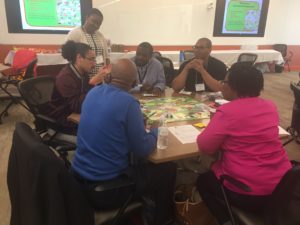PPEPtalk on Preconception Health
 During Chiehiura Akpan’s MPH Practicum with the Office of Minority Health’s Preconception Peer Educator Program (PPE), she was challenged to develop health education activities to address the high rates of infant mortality within the African American community. The PPE strategy uses a peer-led approach whereby college students attending Historically Black Colleges and Universities (HBCUs) are trained as peer educators to train others with an emphasis on preconception health. The Texas version of the PPE is #PPEPtalk which shares the same goals as the PPE but differs from the PPE by its condensed curriculum (it has 8-sessions while the PPE has 14-sessions).
During Chiehiura Akpan’s MPH Practicum with the Office of Minority Health’s Preconception Peer Educator Program (PPE), she was challenged to develop health education activities to address the high rates of infant mortality within the African American community. The PPE strategy uses a peer-led approach whereby college students attending Historically Black Colleges and Universities (HBCUs) are trained as peer educators to train others with an emphasis on preconception health. The Texas version of the PPE is #PPEPtalk which shares the same goals as the PPE but differs from the PPE by its condensed curriculum (it has 8-sessions while the PPE has 14-sessions).
Chiehiura developed health education activities that will supplement the #PPEPtalk session, increase the self-efficacy of peer educators to train others and serve as additional resource tools to peer educators. She developed 7-health education activities all emphasizing preconception heath to reduce infant mortality. She facilitated and taught three of the health activities at a one-day #PPEPtalk training at the University of Texas-Tyler and introduced another activity (Two-Truths and One-Lie activity) to peer educators at Paul Quinn College. Additionally, she directed the #PPEPtalk social media. That responsibility charged her to create a #PPEPtalk Twitter account to facilitate peer recruitment and update the #PPEPtalk Facebook page weekly with information about preconception health and safer sex practices.
The PPE program is in partnership with the University of North Texas Health Science Center, Office of Minority Health, March of Dimes, H3: Healthy Moms, Healthy Babies, Healthy Communities, the Texas Department of State Health Services, the Center for the Elimination of Disproportionality and Disparities and the HBCU community. Infant mortality rates are reducing in the African American Community although their rates are still higher compared to other races. Both Chiehiura and her preceptor are hopeful and optimistic that the program will champion long-term impact in the African American community resulting in healthier babies and communities.
Chiehiura is passionate about working in partnership with communities. She hopes to lend her newly developed skills in program planning and implementation in community work. She envisions her work empowering communities to act, to give voice to the underrepresented or marginalized and to help these communities to obtain social justice. Chiehiura feels her time at UNTHSC prepared her immensely to work with the community. She states she learned a lot both in the classroom and outside the classroom. The course and practicum projects honed her skills and prepared her for future public health work. Her biggest takeaway: No matter how much we know or have to say; the community won’t care to listen until they know that we care.

Social media